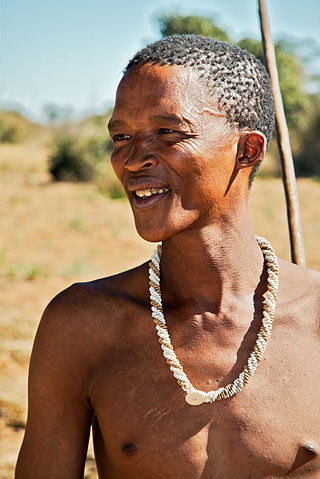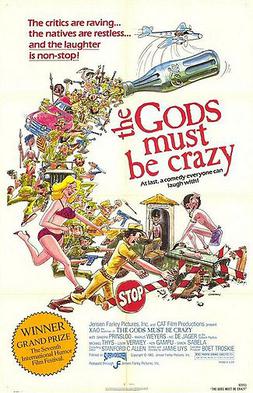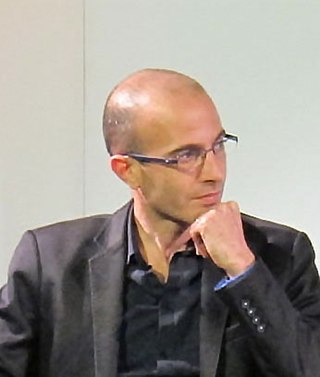
Botswana, officially the Republic of Botswana, is a landlocked country in Southern Africa. Botswana is topographically flat, with approximately 70 per cent of its territory being the Kalahari Desert. It is bordered by South Africa to the south and southeast, Namibia to the west and north, and Zimbabwe to the northeast. It is connected by the Kazungula Bridge to Zambia, across the world's shortest border between two countries.

Survival International is a human rights organisation formed in 1969, a London based charity that campaigns for the rights of Indigenous and/or tribal peoples and uncontacted peoples.

Guns, Germs, and Steel: The Fates of Human Societies is a 1997 transdisciplinary non-fiction book by the American geographer, historian, ornithologist, and author Jared Diamond. In 1998, it won the Pulitzer Prize for general nonfiction and the Aventis Prize for Best Science Book. A documentary based on the book, and produced by the National Geographic Society, was broadcast on PBS in July 2005.

KhoisanKOY-sahn, or Khoe-Sān, is a catch-all term for those indigenous peoples of Southern Africa who do not speak one of the Bantu languages, combining the Khoekhoen and the Sān peoples. Khoisan populations speak click languages and are considered to be the historical (pre-Bantu) communities throughout Southern Africa, remaining predominant until European colonisation in areas climatically unfavorable to Bantu (sorghum-based) agriculture, such as the Cape region, through to Namibia, where Khoekhoe populations of Nama and Damara people are prevalent groups, and Botswana. Considerable mingling with Bantu-speaking groups is evidenced by prevalence of click phonemes in many Southern African Bantu languages.

The Paleolithic diet, Paleo diet, caveman diet, or stone-age diet is a modern fad diet consisting of foods thought by its proponents to mirror those eaten by humans during the Paleolithic era.

The Gods Must Be Crazy is a 1980 comedy film written, produced, edited and directed by Jamie Uys. An international co-production of South Africa and Botswana, it is the first film in The Gods Must Be Crazy series. Set in Southern Africa, the film stars Namibian San farmer Nǃxau ǂToma as Xi, a hunter-gatherer of the Kalahari Desert whose tribe discovers a glass Coca-Cola bottle dropped from an airplane, and believe it to be a gift from their gods. When Xi sets out to return the bottle to the gods, his journey becomes intertwined with that of a biologist, a newly hired village school teacher, and a band of guerrilla terrorists.

The San peoples, or Bushmen, are the members of the indigenous hunter-gatherer cultures of southern Africa, and the oldest surviving cultures of the region. Their ancestral territories span Botswana, Namibia, Angola, Zambia, Zimbabwe, Lesotho and South Africa. They speak, or their ancestors spoke, languages of the Khoe, Tuu and Kxʼa language families, and are only a 'people' in contrast to pastoralists such as the Khoekhoe and descendants of more recent waves of immigration such as the Bantu, Europeans and Asians.

Helen Suzman, OMSG, DBE was a South African anti-apartheid activist and politician. She represented a series of liberal and centre-left opposition parties during her 36-year tenure in the whites-only, National Party-controlled House of Assembly of South Africa at the height of apartheid.

Chimamanda Ngozi Adichie is a Nigerian writer whose works include novels, short stories and nonfiction. She was described in The Times Literary Supplement as "the most prominent" of a "procession of critically acclaimed young anglophone authors" of Nigerian fiction who are attracting a wider audience, particularly in her second home, the United States.

Lewis Wolpert was a South African-born British developmental biologist, author, and broadcaster. Wolpert was best known for his French flag model of embryonic development, where he used the French flag as a visual aid to explain how embryonic cells interpret genetic code for expressing characteristics of living organisms and explaining how signalling between cells early in morphogenesis could be used to inform cells with the same genetic regulatory network of their position and role.

Charles Gabriel Seligman FRS FRAI was a British physician and ethnologist. His main ethnographic work described the culture of the Vedda people of Sri Lanka and the Shilluk people of the Sudan. He was a professor at London School of Economics and was influential as the teacher of well-known anthropologists such as Bronisław Malinowski, E. E. Evans-Pritchard, and Meyer Fortes.
The "original affluent society" is the proposition that argues that the lives of hunter-gatherers can be seen as embedding a sufficient degree of material comfort and security to be considered affluent. The theory was first put forward in a paper presented by Marshall Sahlins at a famous symposium in 1966 entitled 'Man the Hunter'. Sahlins observes that affluence is the satisfaction of wants, "which may be 'easily satisfied' either by producing much or desiring little." Given a culture characterized by limited wants, Sahlins argued that hunter-gatherers were able to live 'affluently' through the relatively easy satisfaction of their material needs.

Brink Lindsey is an American political writer, and Vice President and Director of the Open Society Project at the Niskanen Center. Previously he was the Cato Institute's vice president for research. From 1998 to 2004, he was director of Cato's Center for Trade Policy Studies, focusing on free trade, and also editor of Cato Unbound, a monthly web magazine. He was a senior fellow with the Kauffman Foundation from 2010 to 2012. An attorney with a background in international trade regulation, Lindsey was formerly director of regulatory studies at Cato and senior editor of Regulation magazine.

The Iziko South African Museum is a South African national museum located in Cape Town. The museum was founded in 1825, the first in the country. It has been on its present site in the Company's Garden since 1897. The museum houses important African zoology, palaeontology and archaeology collections.

The World Without Us is a 2007 non-fiction book about what would happen to the natural and built environment if humans suddenly disappeared, written by American journalist Alan Weisman and published by St. Martin's Thomas Dunne Books. It is a book-length expansion of Weisman's own February 2005 Discover article "Earth Without People". Written largely as a thought experiment, it outlines, for example, how cities and houses would deteriorate, how long man-made artifacts would last, and how remaining lifeforms would evolve. Weisman concludes that residential neighborhoods would become forests within 500 years, and that radioactive waste, bronze statues, plastics, and Mount Rushmore would be among the longest-lasting evidence of human presence on Earth.

Yuval Noah Harari is an Israeli author, public intellectual, historian and professor in the Department of History at the Hebrew University of Jerusalem. He is the author of the popular science bestsellers Sapiens: A Brief History of Humankind (2014), Homo Deus: A Brief History of Tomorrow (2016), and 21 Lessons for the 21st Century (2018). His writings examine free will, consciousness, intelligence, happiness, and suffering.

This is a collection of lists of organisms by their population. While most of the numbers are estimates, they have been made by the experts in their fields. Species population is a science falling under the purview of population ecology and biogeography. Individuals are counted by census, as carried out for the piping plover; using the transect method, as done for the mountain plover; and beginning in 2012 by satellite, with the emperor penguin being first subject counted in this manner.
Ancestral land conflict over the Central Kalahari Game Reserve (CKGR) arose in the 1970s between the government of Botswana and the San people (Bushmen), and is ongoing, resulting in one of the most expensive court cases in the history of Botswana.
James Suzman is an anthropologist and the author of Affluence Without Abundance: The disappearing world of the Bushmen published by Bloomsbury in 2017. He is the nephew of Janet Suzman and great-nephew of Helen Suzman. He is based in Cambridge, UK.

An increasing number of scientific studies are reporting substantial declines in insect populations worldwide. Most commonly, the declines involve reductions in abundance, though in some cases entire species are going extinct. The declines are far from uniform. In some localities, there have been reports of increases in overall insect population, and some types of insects appear to be increasing in abundance across the world.

















